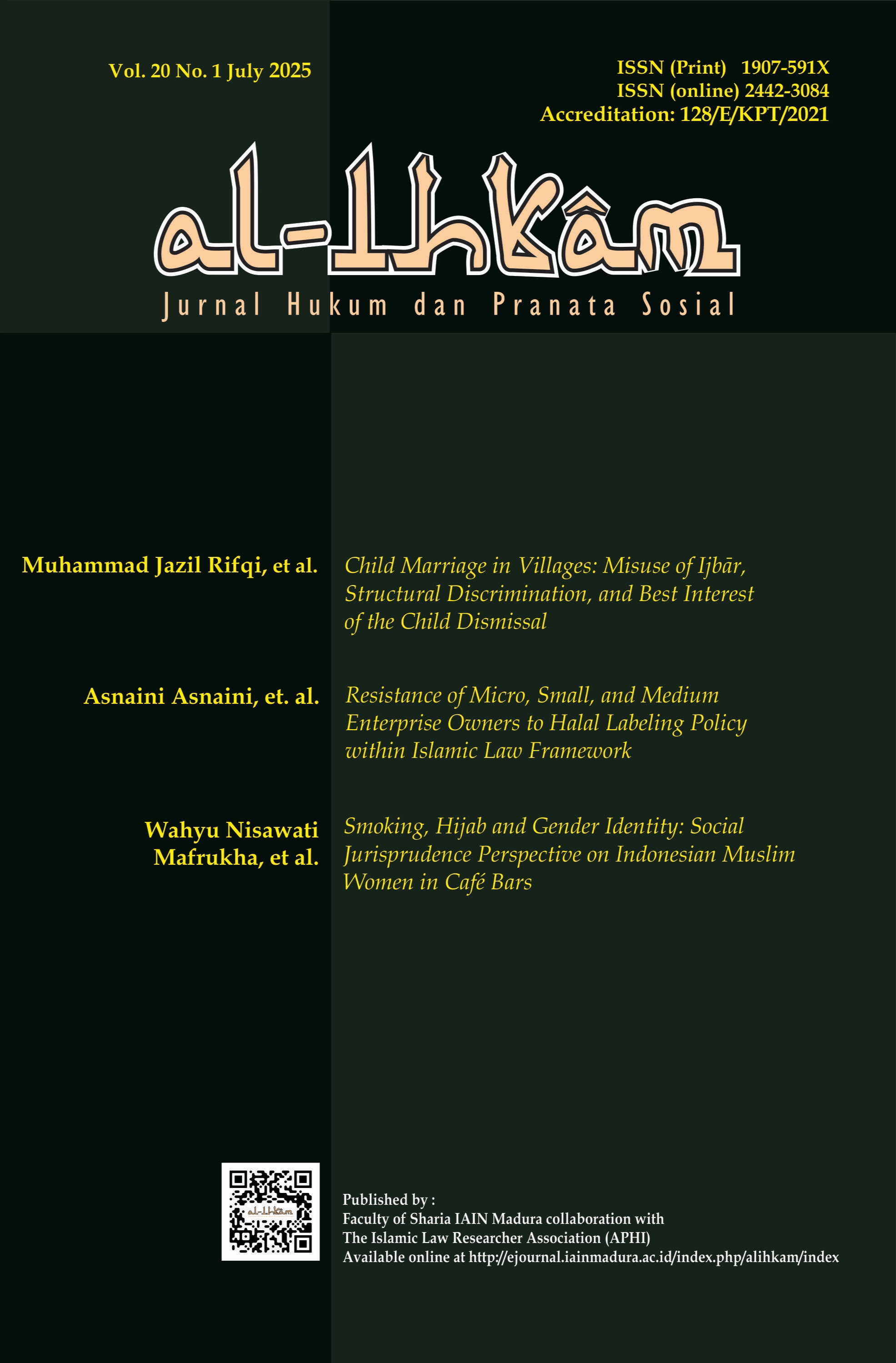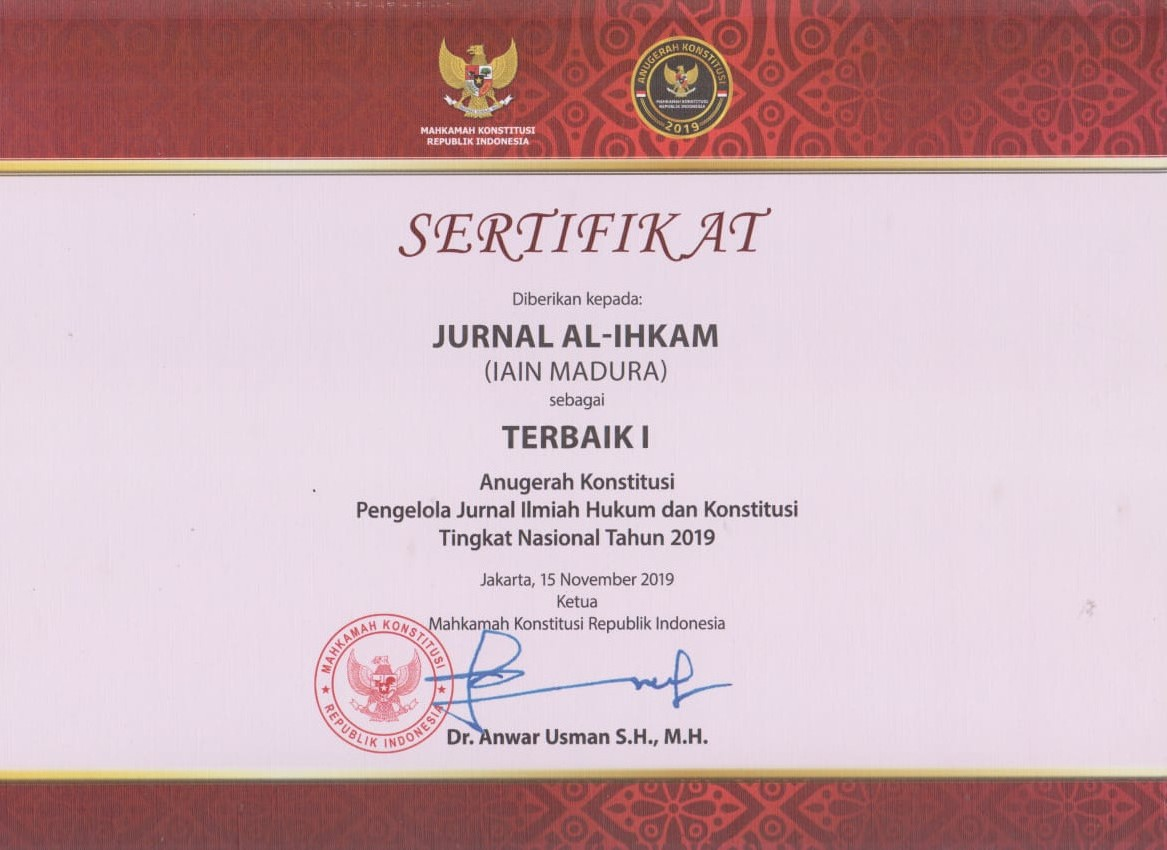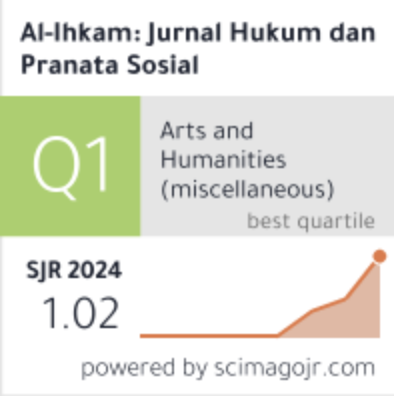The Diversity of Islamic Javanese Kings’ Waqf Management: Ruislag and Various Social Conflicts
 Abstract views: 596
,
Abstract views: 596
,
 PDF downloads: 245
PDF downloads: 245
Abstract
The main benefit of waqf (endowment) assets is fundamentally for the welfare of the community. However, various conflicts often occur within waqf management, such as among nāẓir (waqf managers) and bureaucrats, including that on waqf ruislag (ibdāl) in Kendal, Semarang, and Demak affected by the national road project. Taking the cases as a sample, this research aims to explore various management and utilization of waqf assets, to examine diversity in land exchange involving waqf lands from Javanese kings, and to uncover various conflicts in management and exchange of waqf assets. This study employs a socio-anthropological approach with qualitative analysis. Data were collected through interviews with nāẓir, officials from the Ministry of Religious Affairs, and engaging foundation's staff. Additionally, the research involved reviewing waqf asset records, examining documents, and conducting necessary observations. The findings of this study are: First, a wide variety of waqf assets are managed in different forms, serving various purposes such as education, healthcare, and other social benefits services. Second, as some waqf assets have been impacted by the national road project, ibdāl waqf, when considered for maṣlaḥah ‘āmmah (public benefit), took place under consideration that a particular Islamic law school and Law No. 4 of 2004 allowed it. Third, the ibdāl has given rise to various conflicts involving waqf institutions, foundations, or legal entities. Therefore, conflict prevention is very important for waqf asset governance based on nāẓir collective awareness, regulations, and resolution.
Downloads
References
Achmad, Fikri Ariza, and Irham Zaki. “Implementasi Wakaf Istibdāl dalam Pembebasan Lahan Pembangunan Jalan Tol (Studi Kasus Pembangunan Jalan Tol Surabaya-Mojokerto).” Jurnal Ekonomi Syariah Teori dan Terapan 6, no. 9 (2020): 1924–35. https://doi.org/10.20473/vol6iss20199pp1924-1935.
Al-Kabisi, Muhammad Abid Abdullah. Kajian Kontemporer Pertama dan Terlengkap Tentang Fungsi dan Pengelolaan Wakaf Serta Penyelesaian Atas Sengketa Wakaf Jakarta. Jakarta: IIMaN Press, 2003.
Antonio, Syafi’i, and Junaidi. Pengelolaan Wakaf Secara Produktif dalam Menuju Era Wakaf Produktif. Jakarta: Mumtaz Publishing, 2008.
Ardi, Mohammad Noviani, Dina Yustisi Yurista, and Suci Ramadhan. “Waqf Fundraising Strategy for Islamic Boarding’s Independence.” Ijtihad: Jurnal Wacana Hukum Islam dan Kemanusiaan 20, no. 1 (2020): 1–21. https://doi.org/10.18326/ijtihad.v20i1.1-21.
Arief S., Yasin, and Tali Tulab. “Model Pengelolaan Tanah Wakaf di Kota Semarang.” Ulul Albab: Jurnal Studi dan Penelitian Hukum Islam 2, no. 1 (2018): 63–80. https://doi.org/10.30659/jua.v2i1.3570.
Arroisi, Jarman, and Syamsuri Syamsuri. “Manajemen Wakaf Pondok Modern Darussalam Gontor: Analisis Model Pemeliharaan, Pengembangan Wakaf dan Kesejateraan Umat.” Ijtihad : Jurnal Hukum dan Ekonomi Islam 14, no. 2 (2020): 153–76. https://doi.org/10.21111/ijtihad.v14i2.4701.
Aulya Rachma Damayanti, Silvia Aluf, Nazwa Abidin Yunus, Muhammad Faiz Ferdi Rahman, Danendra Sakhi Rukmana, and Yayat suhayat. “Konsep Wakaf dalam Ilmu Manajemen.” Journal of Creative Student Research 1, no. 4 (2023): 01–21. https://doi.org/10.55606/jcsrpolitama.v1i4.2211.
Azzahro, Siti Fatimah. “Istibdāl Waqf: Sentiment Analysis.” The Economic Review of Pesantren 1, no. 1 (2022): 1–8. https://doi.org/10.58968/erp.v1i1.199.
Badan Pusat Statistik. “Persentase Penduduk Miskin September 2024 Turun Menjadi 8,57 Persen.” Badan Pusat Statistik, January 15, 2025. https://www.bps.go.id/id/pressrelease/2025/01/15/2401/persentase-penduduk-miskin-september-2024-turun-menjadi-8-57-persen-.html.
Badan Wakaf Indonesia. “Receiving Participants of the Ministry of Religion’s Supervisory Leadership Training (PKP), BWI Announces That Cash Waqf Has Currently Reached 3.2 Trillion Rupiah.” Badan Wakaf Indonesia, March 10, 2025. https://www.bwi.go.id/11101/2025/03/10/terima-peserta-pelatihan-kepemimpinan-pengawas-pkp-kemenag-bwi-sampaikan-wakaf-uang-saat-ini-terkumpul-mencapai-32-triliun/.
Bernard, Harvey Russell. Research Methods in Anthropology : Qualitative and Quantitative Approaches. 2nd ed. Thousand Oaks: SAGE Publications Inc, n.d.
Denzin, and Lincoln. The SAGE Handbook of Qualitative Research. Thousand Oaks: SAGE Publications Inc, 2011.
Elimartati, Elimartati, Rizal Fahlefi, and Liza Erniyanti. “Strengthening Family Resilience through the Tradition of Agricultural Zakat Payment in Nagari Lima Kaum in Tanah Datar District of West Sumatera.” Samarah: Jurnal Hukum Keluarga dan Hukum Islam 5, no. 1 (2021): 496. https://doi.org/10.22373/sjhk.v5i1.9147.
Falahy, Lutfi El. “Alih Fungsi Tanah Wakaf Ditinjau dari Hukum Islam dan Undang-Undang Nomor 41 Tahun 2004 Tentang Wakaf.” Al Istinbath: Jurnal Hukum Islam 1, no. 2 (2016): 121–40. https://doi.org/10.29240/jhi.v1i2.117.
Fanani, Mukhyar. Berwakaf Tidak Harus Kaya, Dinamika Pengelolaan Wakaf Uang di Indonesia. Semarang: Walisongo Press, 2010.
Fauzia, Amelia. Filantropi Islam dan Keadilan Sosial. Jakarta: UIN Syarif Hidayatullah, 2006.
Furqon, Ahmad. “Penukaran Tanah Wakaf Masjid Agung Semarang dalam Perspektif Fikih Istibdāl.” Ijtihad : Jurnal Wacana Hukum Islam dan Kemanusiaan 17, no. 1 (2017): 39–60. https://doi.org/10.18326/ijtihad.v17i1.39-60.
G. Suharto, Didik, and Aisyah Nur’ayni. “Pelaksanaan Tukar Guling Tanah Kas Desa Untuk Proyek Pembangunan.” Jurnal Ilmu Administrasi Negara (JUAN) 9, no. 1 (2021): 13–25. https://doi.org/10.31629/juan.v9i1.3121.
Hamzani, Achmad Irwan, and Mukhidin Mukhidin. “Perlindungan Hukum Terhadap Harta Benda Wakaf Sebagai Aset Publik di Kecamatan Wiradesa Kabupaten Pekalongan.” Ijtihad: Jurnal Hukum dan Ekonomi IslamJurnal Wacana Hukum Islam dan Kemanusiaan 16, no. 2 (2017): 159–77. https://doi.org/10.18326/ijtihad.v16i2.159-177.
Islamiyati. “Penyelesaian Sengketa Tanah Wakaf Yang Tidak Tersertifikasi di Wilayah Pesisir Utara Jawa Tengah.” Masalah-Masalah Hukum 47, no. 1 (2018): 71–80. https://doi.org/10.14710/mmh.47.1.2018.71-80.
Ja’far Baehaqi, Nur Khoirin, and Rosman Pangestu. “Rekayasa Hukum dalam Penggantian Obyek Wakaf (Studi Kasus Tukar Guling Tanah Wakaf Untuk Proyek Jalan Tol Semarang-Demak).” LP2M UIN Walisongo Semarang. Semarang, 2022. https://eprints.walisongo.ac.id/id/eprint/19626/.
Latif. “Kajian Yuridis Pengadaan Tanah Untuk Pembangunan Jalan Tol Batang-Semarang Ii Seksi V di Kota Semarang.” Jurnal Spektrum Hukum 15, no. 1 (2018): 124–38. https://jurnal.untagsmg.ac.id/index.php/SH/article/download/1113/960.
M. Iqbal, Reni Ilma Sari, Safrina Safitri, and Upik Nurhasanah. “Implementasi Good Coorporate Governance Terhadap Pengelolaan Wakaf Produktif Pada RSU Haji Medan.” MUQADDIMAH: Jurnal Ekonomi, Manajemen, Akuntansi dan Bisnis 2, no. 2 (2024): 211–18. https://doi.org/10.59246/muqaddimah.v2i2.746.
Malik, Bilal Ahmad. “Philantrophy in Practice: Role of Zakat in the Realization of Justice and Economic Growth.” International Journal of Zakat 1, no. 1 (2016): 64–77. https://doi.org/10.37706/ijaz.v1i1.7.
Malikī, Al-Imām Yahya Ibnu Muhammad al-Khaţţab al. Ahkam Al Waqfi. Beirut: Dār Ibnu Hazm, 2009.
Misbachudin. “Tukar Guling (Ruislag) Tanah Wakaf Pada Proyek Jalan Tol Pejagan-Pemalang di Kabupaten Tegal Perspektif Hukum Islam.” Tesis. Institut Agama Islam Negeri Purwokerto, 2018. https://repository.uinsaizu.ac.id/4242/.
Mohd Nor, Khairul Anwar, Mohd Adib Ismail, Muhammad Hakimi Mohd Shafiai, Khairunnisa Hasbullah, and Mohd Noor Mohd Ali. “Islamic Philantropy Adaptation Towards Financial Social Exclusion Among Independen Oil Palm Smallholder.” Etikonomi 21, no. 2 (2022): 369–82. https://doi.org/10.15408/etk.v21i2.18677.
Mubarok, Jaih. Wakaf Produktif. Bandung: Simbiosa Rekatama Media, 2008.
Mulyana, Dedy. Metodologi Penelitian Kualitatif. Bandung: PT Remaja Rosda Karya, 2004.
Nugroho, Muhammad Wahyu. “Penarikan Kembali Asset Wakaf Oleh Ahli Waris Wakif (Studi di Kecamatan Mranggen Kabupaten Demak).” Tesis. Universitas Islam Sultan Agung Semarang, 2022. http://repository.unissula.ac.id/id/eprint/27638.
Qahf, Mundzir. Al-Waqf Al-Islamī: Tatawwuruhu, Idāratuhu, Tanmiyyatuhu. Damascus: Dār Fikr, 2000.
Ritzer, George, and Donglas J. Goodman. Teori Sosiologi Modern. Jakarta: Prenada Media Group, 2003.
Robertson, Roland. “Globalisation or Glocalisation?” The Journal of International Communication 1, no. 1 (1994): 33–52. https://doi.org/10.1080/13216597.1994.9751780.
Roland, Robertson. Globalization: Social Theory and Global Culture. 2nd ed. New Delhi: SAGE Publications Inc, 1992.
Saprida, Zuul Fitriani Umari, and Fitri Raya. “Sistem Pengeloaan Wakaf Saham di Indonesia dalam Perspektif Hukum Islam dan Perundang-Undangan Perwakafan.” Ekonomica Sharia: Jurnal Pemikiran Dan Pengembangan Ekonomi Syariah 9, no. 2 (2024): 221–34. https://doi.org/10.36908/esha.v9i2.991.
Sholihah, Hidayatus, and A. Zaenurrosyid. “Islamic Philanthropy Development Model Based on Management of Waqf Treasure Improvement on the Mosques of the Northern Seaboard of Java.” In Proceedings of the 2nd Southeast Asian Academic Forum on Sustainable Development (SEA-AFSID 2018), 168:63–70. Atlantis Press, 2021. https://doi.org/10.2991/aebmr.k.210305.012.
Srimulyani, Eka, Marzi Afriko, M. Arskal Salim, and Moch Nur Ichwan. “Diaporic Chinese Community in Post Conflict Aceh : Socio-Cultural Identities and Social Relations with the Acehnese Muslim Majority.” Al-Jami’ah: Journal of Islamic Studies 56, no. 2 (2018): 395–420. https://doi.org/10.14421/ajis.2018.562.395-420.
Sudiyo, and Fitriani. “Lembaga Ziswaf Sebagai Lembaga Filantropi Islam Dan Pemberdayaan Masyarakat di Kota Bandar Lampung Ziswaf Institution as Islamic Philanthropy Institute and Community Empowerment in Bandar Lampung City.” In Prosiding Seminar Nasional Pengembangan Teknologi Pertanian, 85–89, 2019. https://doi.org/10.25181/prosemnas.v0i0.1591.
Suhadi, Imam. Wakaf Untuk Kesejahteraan Umat. Yogyakarta: PT Dana Bhakti Prima Yasa, 2022.
Syaikhu, Norwili, Maimunah, and Laili Wahyunita. “The Empowerment of Infaq and Waqf Evaluation in Light of Maqasid Al-Sharia Perspective in Mosques in Palangka Raya, Indonesia.” Samarah: Jurnal Hukum Keluarga dan Hukum Islam 5, no. 2 (2021): 1003–20. https://doi.org/10.22373/sjhk.v5i2.8997.
Thohir, Mujahirin. Islam Jawa Pesisiran. Semarang: Fasindo, 2002.
———. Memahami Kebudayaan: Teori Metodologi, dan Aplikasi. Semarang: Fasindo Press, 2007.
Yumarni, Ani, Endeh Suhartini, Abdurrahman Haqqi, Hidayat Rumatiga, and Siti Maryam. “The Meaning of ‘Amânah’ and ‘Trust’ in the Appointment of Nâzhir in Indonesian Endowment Regulations.” Al-’Adalah 20, no. 1 (2023): 115–36. https://doi.org/10.24042/adalah.v20i1.14517.
Yusuf, Agus Fathuddin. Melacak Bondo Masjid Yang Hilang. Semarang: Aneka Ilmu, 2001.
Yusuf, Muhammad Zulfikar. “Optimalisasi Wakaf Tanah Perspektif Istibdāl (Studi Pada Harta Wakaf Pimpinan Daerah Muhammadiyah Kota Yogyakarta).” Jurnal Magister Ekonomi Syariah 1, no. 1 (2022): 63–73. https://doi.org/10.14421/jmes.2022.011-06.
Zaenurrosyid, A., Syarul Azman Bin Shaharudin, Hidayatus Sholihah, and Asmaji. “The Dynamics of Productive Waqf Management of Islamic Kingdom Property in Java.” Al-’Adalah 21, no. 1 (2024): 149–74. https://doi.org/10.24042/adalah.v21i1.16384.
Zahratul Faizah, Nora Mia Azmi, Lutfi Aisyah, and Anggi Azhari. “Pentingnya Legalitas dan Pemanfaatan Aset Waqaf (Wakaf Produktif).” JKA - Jurnal Kolaboratif Akademika 1, no. 2 (2024): 1–10. https://doi.org/10.26811/hy5er402.
Copyright (c) 2025 AL-IHKAM: Jurnal Hukum & Pranata Sosial

This work is licensed under a Creative Commons Attribution-ShareAlike 4.0 International License.
In order to be accepted and published by Al-Ihkam: Jurnal Hukum dan Pranata Sosial, author(s) submitting the article manuscript should complete all the review stages. By submitting the manuscript, the author(s) agreed to the following terms:
- The copyright of received articles shall be assigned to Al-Ihkam: Jurnal Hukum dan Pranata Sosial as the publisher of the journal. The intended copyright includes the right to publish articles in various forms (including reprints). Al-Ihkam: Jurnal Hukum dan Pranata Sosial maintain the publishing rights to the published articles.
- Authors are permitted to disseminate published articles by sharing the link/DOI of the article at Al-Ihkam: Jurnal Hukum dan Pranata Sosial. Authors are allowed to use their articles for any legal purposes deemed necessary without written permission from Al-Ihkam: Jurnal Hukum dan Pranata Sosial with an acknowledgment of initial publication to this journal.
- Users/public use of this website will be licensed to CC-BY-SA.



.png)
_1.png)


_page-00011.jpg)


